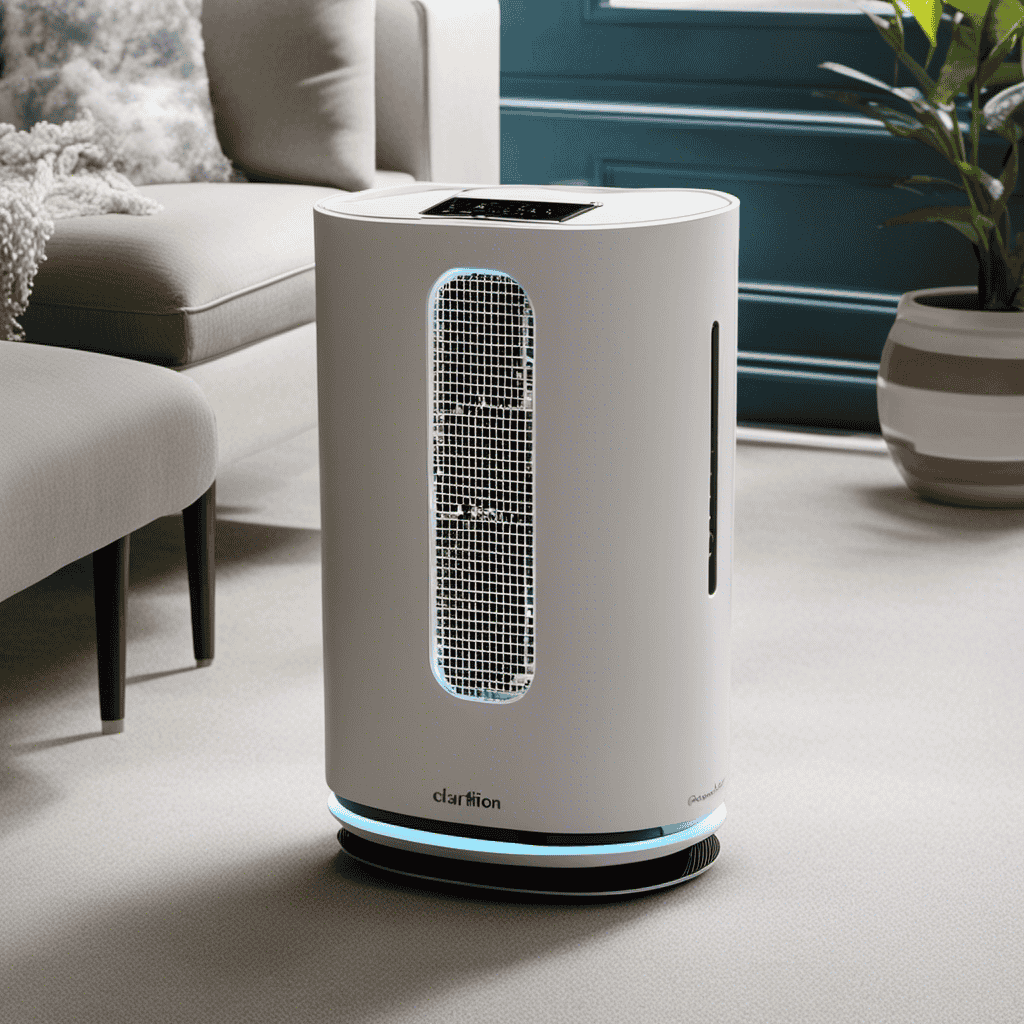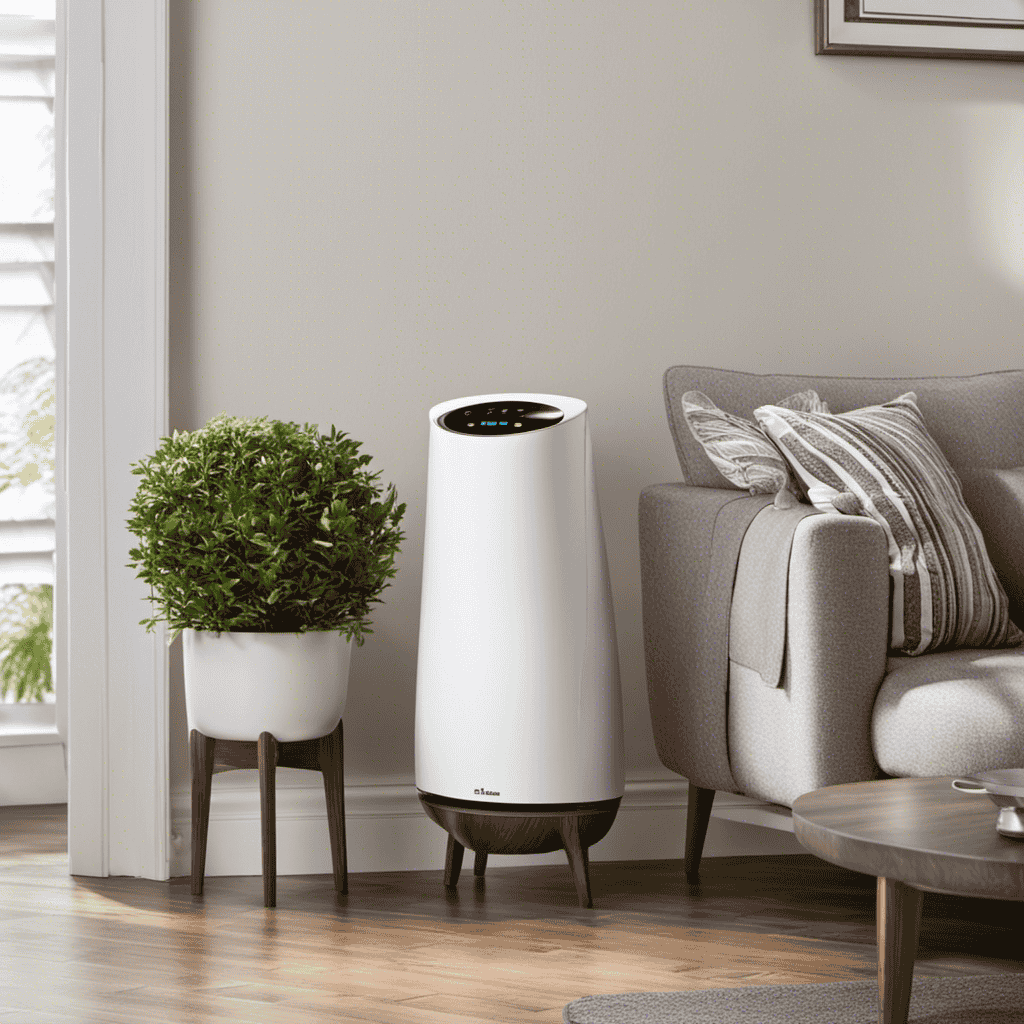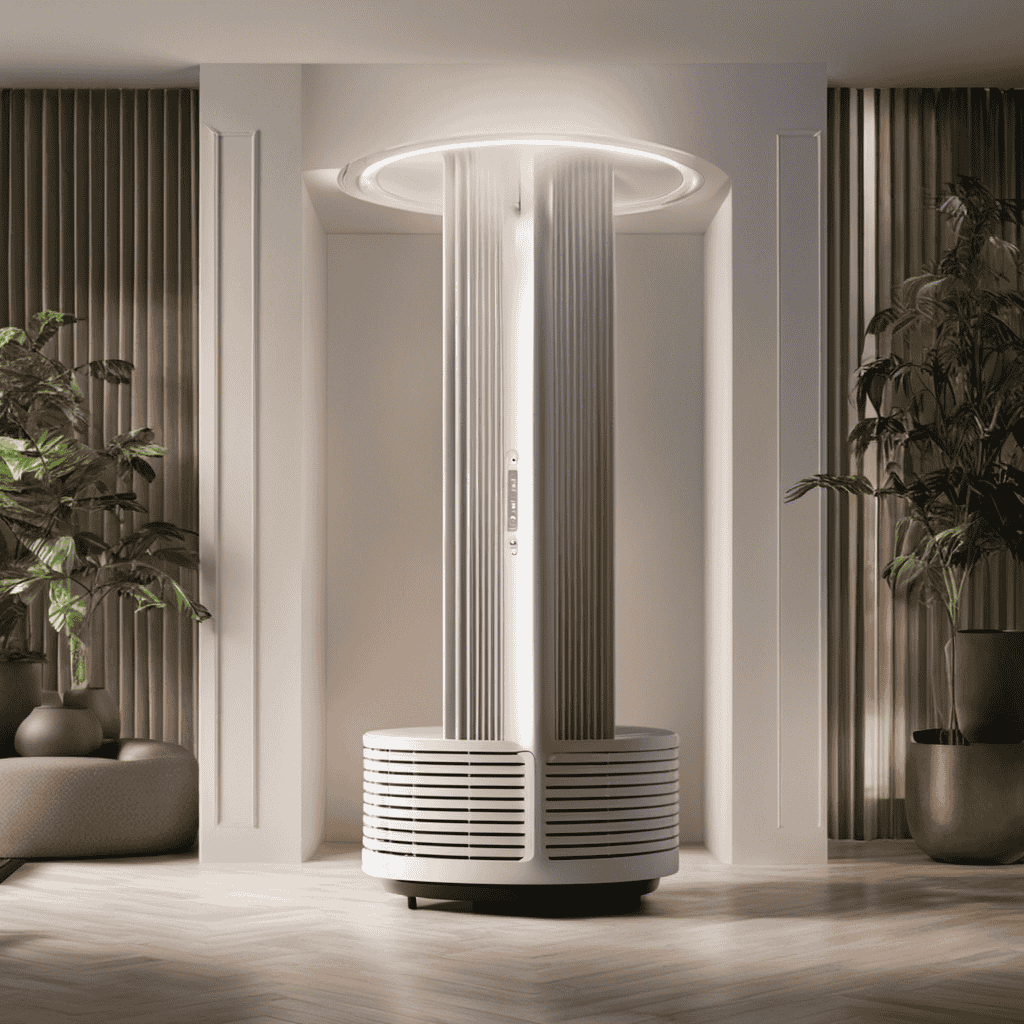As someone who deals with asthma, I am familiar with the challenges of finding solutions to ease symptoms and enhance air quality. That’s why I am enthusiastic about investigating the query, ‘Are air purifiers beneficial for asthma?’
In this article, we’ll dive into the impact of air pollution on asthma symptoms and how air purifiers can help. We’ll also discuss key features to look for when choosing an air purifier and provide expert recommendations for managing asthma with these devices.
So, let’s jump in and clear the air on this important topic.
Key Takeaways
- Air purifiers can effectively remove common allergens and indoor air pollutants that worsen asthma symptoms.
- Air purifiers with HEPA filters can help decrease airway inflammation and improve lung function in individuals with asthma.
- Choosing an air purifier with true HEPA filters, activated carbon filters, and a sufficient air exchange rate can significantly improve air quality and help manage asthma symptoms.
- Air purifiers should be used in conjunction with other asthma management strategies and regular maintenance and filter replacement are essential for optimal performance.
Understanding Asthma and Air Quality
Understanding asthma and air quality is crucial for determining whether air purifiers are beneficial.
Asthma is a chronic respiratory condition characterized by inflammation and narrowing of the airways. It is often triggered by various factors such as allergens, irritants, and pollutants. Indoor air pollutants can be major asthma triggers, including dust mites, pet dander, mold spores, and volatile organic compounds (VOCs) emitted from household products. These pollutants can worsen asthma symptoms and lead to increased respiratory distress.
Air purifiers are designed to remove these indoor air pollutants, potentially reducing their impact on asthma symptoms. By filtering out particles and allergens from the air, air purifiers aim to create a cleaner and healthier environment. However, it is important to note that air purifiers are not a cure for asthma, and their effectiveness may vary depending on individual sensitivities and the specific pollutants present.
To determine the benefits of air purifiers for asthma, it is crucial to consider the impact of air pollution on asthma symptoms. High levels of outdoor air pollution, such as vehicle emissions and industrial pollutants, have been linked to increased asthma exacerbations and decreased lung function. Therefore, reducing exposure to outdoor air pollution through the use of air purifiers may provide additional benefits for individuals with asthma.
The Impact of Air Pollution on Asthma Symptoms
The impact of air pollution on asthma symptoms can be significant. When air pollution levels rise, individuals with asthma are more likely to experience worsened symptoms. Here are four key facts about the impact of air pollution on asthma prevalence:
-
Increased risk: Exposure to air pollution, such as particulate matter and nitrogen dioxide, increases the risk of developing asthma in children and adults. This highlights the importance of reducing air pollution to prevent new cases of asthma.
-
Exacerbation of symptoms: Air pollution can trigger asthma attacks and exacerbate existing symptoms, leading to increased hospitalizations and emergency room visits. This highlights the urgent need for effective interventions to reduce air pollution and protect the respiratory health of individuals with asthma.
-
Long-term effects: Prolonged exposure to air pollution can lead to the development of chronic respiratory conditions, including chronic obstructive pulmonary disease (COPD), which can further worsen asthma symptoms. This emphasizes the need for long-term strategies to address air pollution and its impact on respiratory health.
-
Role of air purifiers: While air purifiers can help improve indoor air quality, their effectiveness in reducing asthma exacerbations is still a topic of debate. Some studies suggest that air purifiers can reduce indoor air pollution and improve asthma symptoms, but more research is needed to determine their long-term benefits.
How Air Purifiers Can Help Alleviate Asthma Symptoms
If you’re looking for a solution to alleviate your asthma symptoms, consider using air purifiers. Air purifiers have been shown to have numerous benefits in managing asthma. They work by removing allergens and irritants from the air, creating a cleaner and healthier environment for individuals with asthma. Here are three key benefits of using air purifiers for asthma management:
| Benefit | Description | Evidence |
|---|---|---|
| 1. Reduction of Allergens | Air purifiers can effectively remove common allergens such as dust mites, pet dander, and pollen from the air, reducing the triggers that can worsen asthma symptoms. | A study published in the Journal of Asthma found that using air purifiers significantly reduced the levels of indoor allergens, leading to improved asthma control. |
| 2. Elimination of Indoor Air Pollutants | Air purifiers can also remove indoor air pollutants, such as volatile organic compounds (VOCs), tobacco smoke, and mold spores. These pollutants can exacerbate asthma symptoms and trigger asthma attacks. | Research conducted by the American Lung Association showed that air purifiers equipped with HEPA filters effectively removed indoor air pollutants, improving indoor air quality and reducing asthma symptoms. |
| 3. Enhanced Breathing Environment | By removing airborne particles and pollutants, air purifiers create a cleaner and healthier breathing environment. This can lead to improved lung function and reduced asthma symptoms. | A study published in the Journal of Allergy and Clinical Immunology demonstrated that using air purifiers with HEPA filters led to decreased airway inflammation and improved lung function in individuals with asthma. |
Key Features to Look for in an Air Purifier for Asthma
When choosing an air purifier for managing your asthma, look for key features that can effectively remove allergens and pollutants from your environment. Here are four essential features to consider:
-
HEPA filtration: High-efficiency particulate air (HEPA) filters are known for their effectiveness in capturing tiny particles, including common asthma triggers like dust mites, pollen, pet dander, and mold spores. Look for an air purifier with a true HEPA filter, as it can remove up to 99.97% of particles as small as 0.3 microns.
-
Activated carbon filter: Asthma control also involves reducing exposure to volatile organic compounds (VOCs) and odors. An air purifier with an activated carbon filter can effectively adsorb these chemicals, helping to improve indoor air quality and minimize asthma symptoms.
-
Air exchange rate: To ensure continuous purification, consider the air exchange rate of the purifier. This refers to the number of times the air in a room is fully filtered per hour. Aim for a purifier with a high air exchange rate, ideally at least 4-5 times per hour.
-
Size and coverage area: Properly sizing your air purifier is crucial for optimal effectiveness. Consider the square footage of the room where it will be used and choose a purifier that can adequately cover that area. Oversized or undersized purifiers may not effectively filter the air, impacting asthma control.
Choosing an air purifier with these key features can significantly improve air quality and help manage your asthma symptoms.
Now, let’s delve into the different types of air purifiers and their suitability for asthma control.
Choosing the Right Type of Air Purifier for Asthma
Consider your specific needs and preferences when selecting the type of air purifier that will be most effective in managing your asthma symptoms. It is important to choose an air purifier that is specifically designed to target and remove asthma triggers from the air.
There are several different types of air purifiers available, each with its own unique features and benefits.
One type of air purifier that has been found to be effective in managing asthma symptoms is a High Efficiency Particulate Air (HEPA) filter. These filters are capable of capturing particles as small as 0.3 microns, including allergens such as dust mites, pollen, pet dander, and mold spores. HEPA filters are also known for their high air purifying efficiency and low maintenance requirements.
Another type of air purifier that can be effective for asthma is an activated carbon filter. These filters are designed to remove odors, chemicals, and volatile organic compounds (VOCs) from the air. Activated carbon filters work by adsorbing these substances onto the surface of the carbon, trapping them and preventing them from being released back into the air.
When it comes to air purifier maintenance, it is important to regularly clean or replace the filters. This will ensure that the air purifier continues to effectively remove asthma triggers from the air. Additionally, it is recommended to clean the exterior of the air purifier regularly to prevent the buildup of dust and allergens.
Tips for Using an Air Purifier to Improve Asthma Control
One effective way to improve control of your asthma is by using an air purifier. Air purifiers have been shown to significantly reduce the presence of allergens and pollutants in indoor air, thus improving the overall air quality and potentially reducing asthma symptoms.
Here are four key benefits of using an air purifier to improve asthma control:
-
Removal of allergens: Air purifiers are designed to capture and eliminate common allergens such as dust mites, pollen, pet dander, and mold spores. By reducing the presence of these triggers in the air, air purifiers can help alleviate asthma symptoms and improve overall respiratory health.
-
Elimination of airborne pollutants: Indoor air can contain various pollutants, including volatile organic compounds (VOCs), chemicals, and smoke particles. Air purifiers equipped with activated carbon filters or HEPA filters can effectively remove these pollutants, creating a cleaner and healthier environment for asthma sufferers.
-
Prevention of respiratory infections: Air purifiers can help minimize the spread of respiratory viruses and bacteria by filtering out airborne germs. This can be particularly beneficial for individuals with asthma, as respiratory infections can worsen asthma symptoms and trigger asthma attacks.
-
Improved sleep quality: By ensuring cleaner air, air purifiers can help improve sleep quality for asthma sufferers. Breathing in cleaner air during sleep can reduce nighttime asthma symptoms, such as coughing and wheezing, allowing for a more restful sleep.
Potential Drawbacks and Limitations of Air Purifiers for Asthma
If you rely solely on an air purifier, it may not completely eliminate all triggers and pollutants that can worsen your asthma symptoms. While air purifiers have been shown to be effective in reducing indoor air pollution, there are potential limitations to consider.
The effectiveness debate surrounding air purifiers lies in their ability to remove all asthma triggers and pollutants from the air.
One of the potential limitations of air purifiers is their inability to remove certain types of pollutants, such as gases and volatile organic compounds (VOCs). These substances can be released from household products, building materials, and even some air fresheners. Additionally, air purifiers may not be able to completely eliminate allergens like pet dander and pollen, which can still trigger asthma symptoms.
Furthermore, the effectiveness of air purifiers depends on factors such as the size of the room and the airflow rate of the purifier. In larger rooms, the purifier may not be able to effectively clean the air, leading to reduced benefits for asthma management.
Despite these potential limitations, air purifiers can still be a helpful tool in managing asthma symptoms. They can reduce overall indoor air pollution and provide relief for individuals with asthma. However, it is important to use air purifiers in conjunction with other asthma management strategies, as recommended by experts.
In the next section, we will explore expert recommendations for air purifier use in asthma management.
Expert Recommendations for Air Purifier Use in Asthma Management
When using air purifiers to manage asthma, experts recommend taking into account factors such as room size and airflow rate for optimal effectiveness. Here are four key considerations to keep in mind:
-
Room size: The size of the room where the air purifier will be used plays a crucial role in its effectiveness. It’s important to choose an air purifier that is suitable for the square footage of the room. A purifier that’s too small may not adequately filter the air, while one that’s too large may consume unnecessary energy.
-
Airflow rate: The airflow rate of an air purifier determines how quickly it can clean the air in a given space. Higher airflow rates are generally recommended for individuals with asthma, as they can help remove allergens and other irritants more efficiently. Look for air purifiers with adjustable fan speeds to customize the airflow rate to your needs.
-
Filtration system: A good air purifier for asthma management should have a high-quality filtration system. HEPA filters are considered the gold standard, as they can capture up to 99.97% of airborne particles, including allergens and pollutants. Additionally, consider purifiers with activated carbon filters to remove odors and chemicals from the air.
-
Maintenance and filter replacement: Regular maintenance and filter replacement are essential for optimal air purifier performance. Make sure to follow the manufacturer’s instructions for cleaning and replacing filters to ensure the purifier continues to effectively manage asthma symptoms.
– Can Air Purifiers Specifically Designed for Asthma Really Help with Symptoms?
If you suffer from asthma, investing in one of the best asthma air purifiers could provide significant relief. These specially designed purifiers can effectively remove common asthma triggers like dust, mold, and pet dander from the air, helping to alleviate symptoms and improve overall air quality in your home.
Frequently Asked Questions
Are Air Purifiers a Substitute for Asthma Medications?
Air purifiers can be beneficial for asthma sufferers, but they are not a substitute for medications.
While air purifiers can help remove allergens and pollutants from the air, they do not treat the underlying causes of asthma or provide the necessary relief during an asthma attack.
However, using an air purifier in conjunction with medication can help improve air quality and reduce asthma symptoms.
It is important to consult with a healthcare professional to develop a comprehensive asthma management plan.
Can Air Purifiers Completely Eliminate Asthma Symptoms?
Air purifiers are an effective tool for managing asthma symptoms. They can help reduce the presence of airborne irritants such as pollen, dust mites, and pet dander, which can trigger asthma attacks.
While air purifiers cannot cure asthma or completely eliminate symptoms, they can significantly improve air quality and reduce the need for asthma medications.
How Often Should I Replace the Filters in an Air Purifier for Asthma?
When it comes to maintaining the effectiveness of an air purifier for asthma, it is crucial to replace the filters regularly. The frequency of filter replacement depends on various factors, such as the manufacturer’s recommendations, the air quality in your environment, and the level of usage.
Generally, it is advised to replace the filters every 3-6 months for optimal performance. However, some high-quality air purifiers for asthma may have longer-lasting filters that can last up to a year.
Do Air Purifiers Remove All Types of Asthma Triggers From the Air?
Well, let me tell you, air purifiers can be quite effective when it comes to removing all types of asthma triggers from the air. These handy devices work by filtering out particles like dust, pollen, pet dander, and mold spores, which are common triggers for asthma symptoms.
Can Air Purifiers Worsen Asthma Symptoms if Not Used Properly?
Air purifier maintenance is crucial to ensure they don’t worsen asthma symptoms.
Many people have misconceptions about air purifiers and asthma, assuming they can eliminate all triggers from the air.
However, if not used properly, air purifiers can actually circulate allergens and irritants, potentially exacerbating asthma symptoms.
It’s important to regularly clean and replace filters, follow manufacturer instructions, and choose a purifier with a HEPA filter to effectively reduce asthma triggers in the air.
Conclusion
In conclusion, air purifiers can be an effective tool in managing asthma symptoms by reducing the levels of air pollutants that can trigger asthma attacks.
However, it is important to choose the right type of air purifier and utilize it correctly to maximize its benefits.
While air purifiers can improve air quality and alleviate asthma symptoms, they are not a substitute for proper medication and asthma management.
Consulting with healthcare professionals and following expert recommendations is crucial for effectively incorporating air purifiers into asthma management plans.










